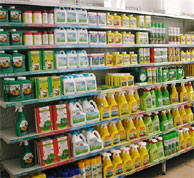Does it dupe consumers to tell fibs?
Bill Brett questions the accuracy of some interpretations and recommendations, especially those focussed on the perceived popularity of 'green / eco-friendly / organic' products.
Consumer research is an important tool in planning and decision making for retailers. A really vital part of the research is the interpretation of results.
In recent times I have read a number of research papers carried out by government departments and industry bodies on consumer thinking and behaviour relative to garden retail.
The authors’ interpreted results were different from my interpretation, and different from what I could see was actually happening in retail stores.
In several recent studies, in relation to buying green, eco-friendly or organic; consumers have been asked about their buying habits; selection of products; where they shopped etc. The research interviews have been conducted mostly by phone but in some cases face to face. The questions were cached along the lines of: Do you buy or intend to buy “organically grown” or “organic” products?
 It’s the type of predictive questioning that inevitably leads the consumer to give an answer that is expected. Because celebrity and media hype has made “green / organic” fashionable and politically correct, they feel they should answer “yes I always look for or buy organic”.
It’s the type of predictive questioning that inevitably leads the consumer to give an answer that is expected. Because celebrity and media hype has made “green / organic” fashionable and politically correct, they feel they should answer “yes I always look for or buy organic”.
A more accurate way of researching this question would be to interview customers and analyse their shopped selection as they exit a store - after they have been subjected to a full range of organic and non-organic product and prices on offer and made a conscious choice.
One such NZ study interviewed customers entering a supermarket and asked – do you intend buying organic produce? 44% responded ‘Yes’-
The same customers were then interviewed on exiting the store and it was found only 6% had actually purchased organic produce.
The other 38% who said they intended to, did not purchase organic produce because it was too expensive and of poor quality.
This result highlights that there is a difference between what customers say they do or intend to do; and what they actually do.
Tesco found similar results in a recent UK study related to food miles of imported foods
Because the concept of Green / organic / eco friendly is fashionable and it could be said politically correct, much research is set to capture a positive result for the ‘green – organic’ view.
In addition it could be said researchers interpret results to a pre determined conclusion. Between the cached questions and interpretation bias, such a conclusion could encourage garden centres that it would be in their interest to primarily cater for and promote organic.
When reading research results related to consumer behaviour it’s important to read the whole paper, paying particular attention to methodology, and interpretation, not just the headlines or conclusion.
 The same argument applies to organic fertilisers and pest control. Science is now showing that some natural organic remedies are more hazardous than synthetic products.
The same argument applies to organic fertilisers and pest control. Science is now showing that some natural organic remedies are more hazardous than synthetic products.
Our surveys from customer focus groups indicate that most customers wish to avoid products that are environmentally unfriendly or toxic, are happy with soft chemicals, and like the idea of ‘sustainable’ rather than following an ‘organic’ doctrine.
Actual sales of ‘organic’ are growing, but they still remain a very small part of total sales. Customers shop for effectiveness and price.
This does not necessarily mean that we should ignore the demand for green / organic, but it must be of a quality and price that is competitive with products that are regarded as conventional.
Of course Garden centres should be mindful of the customers concerns and avoid recommending or selling products which are known to be hazardous. To ensure customers obtain a good result, it’s better to recommend products which are proven and cost effective as well as soft and environmentally friendly.
Fortunately, the vast majority of products packed for home gardeners are eco friendly and do meet sustainable ideals.
Despite what the headlines, surveys and research wish us to believe, it is the methodology and interpretation that is key and the reality is - quality and price continue to be the major drivers of customer buying behaviour.
Bill recommends a couple of books that also question interpretation of research:
What's the Worst That Can Happen - author Greg Craven
Bad Science - author Ben Goldacre
